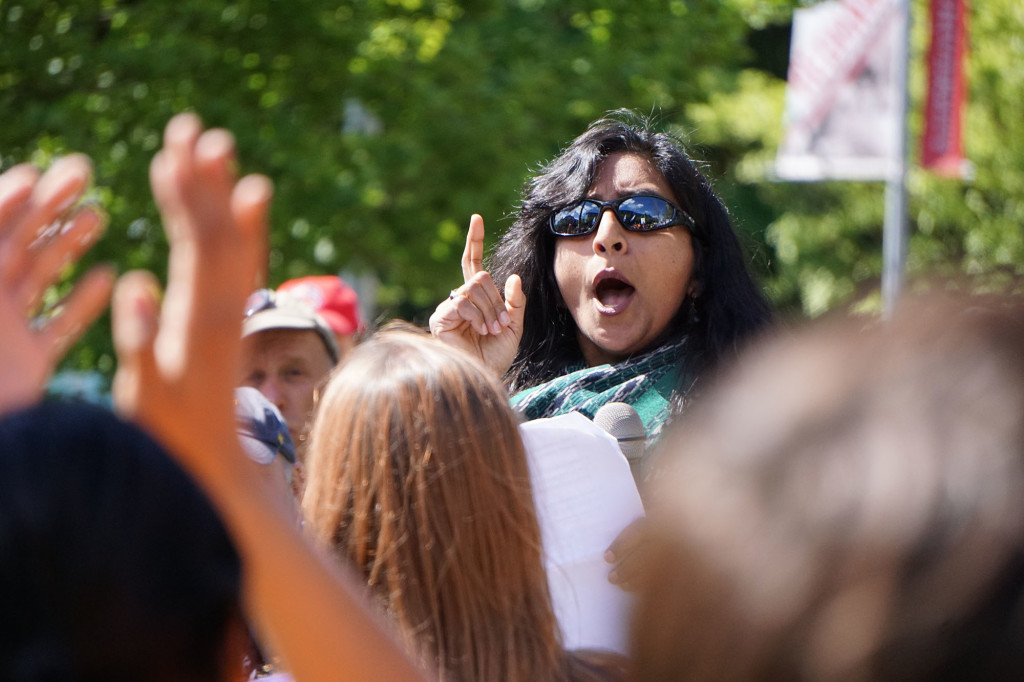As many students sat in the Student Center on Tuesday, May 16 night, eating dinner, studying or chatting with friends, they may have heard occasional cheering, yelling and applause coming from a room behind the dining area. These noises were made by both community members and students engaged in a city hearing regarding the juvenile detention center’s renovation in the Central District.

Councilmember Sawant rallies the crowd at Fast for Justice, a protest for workers’ rights Seattle U faculty members joined in spring of 2015.
This detention center, located a few blocks south of Campion Hall, is being renovated as part of a $210 million project, approved by voters in 2012. Many view this project as a necessary reparation of a deteriorating facility. According to The Seattle Times, the current detention center was built in 1952 and was intended to last for 30 years—meaning that it’s several- decades overdue for renovation.
Others believe this financial investment will only guarantee the expansion of youth detention in coming years. Those at the hearing were almost entirely unified in their opposition to the youth incarceration center; none of the testimonies argued in favor of the renovation.
At Tuesday’s hearing, city council members Mike O’Brien and Kshama Sawant wanted to hear public testimony regarding the youth incarceration center, and they ultimately voted to pass a piece of legislation that would correct a mistake in legislation in 2014. This mistake meant that their land-use decision was not appealable.
The new legislation reframes the decisions necessary to begin renovation of the new youth incarceration center and can now be fought through the court system.
During the public testimony, several community members and students voiced their strong disapproval of the youth jail, on the grounds of racism, mental health and ethics, among many other reasons.
A nurse practitioner named Susan Taylor said during a testimony that the incarceration center is not the way to promote lower rates of youth incarceration.
“Child incarceration in King County is declining,” Taylor said during the hearing. “It is unconscionable that we should celebrate this victory by building a $210 million temple to racism. So please, please stop this badly misguided venture. It’s not too late. Listen to the voices you’ve already heard speaking today. These youth of color have solutions. They have proposed many incredibly detailed, sophisticated and viable alternatives that we must use this money for.”
Community organizer Senait Brown said during her public testimony that the fight against the youth jail was not an isolated incident, but a part of a greater systemic problem.
“‘No New Youth Jail’ is not separate from the fact that the Central District has been gentrified—has been gentrified,” she said. “It’s no different from the displacement fight that’s happeningon23rdandUnionright now; it’s no different than watching developers come in and take land sold off by this youth prison to create condos and student housing; it’s no different from SU accepting a contract to work with Howard S. Wright to build a student dorm to support a youth prison. We are talking about the same issue.”
Brown is referring to the new construction of the 1107 dorm student housing project behind Xavier, which broke ground this week. Both buildings, according to the websites of Pacific Stair Corporation and King County, are contracted by Howard S. Wright.
Brown added that while the hearing was attempting to amend a city ordinance, it served a primary purpose of strengthening the community and its understanding of oppression.
“I understand that we are here to strengthen an ordinance, but we’re here to strengthen organizing, and we’re here to get clear about what we’re actually fighting,” Brown said. “We’re fighting a youth jail, but we’re also fighting racism and systemic oppression.”
After the public testimony, Councilmember O’Brien offered an apology, both for the mistake in the legislation granting a land permit in 2014, and for his vote in favor of that legislation.
“I want to just apologize to folks in the room that you all have to be here fighting to change a system that should have never been created in the first place,” O’Brien he said. “I’m grateful that we have a little opportunity to correct that one mistake, but I don’t want to pretend that correcting that one mistake undoes the years of injustice that, to an extent, that I’ve been a part of, and certainly, I and my family have benefitted from that system, and that’s not fair and not right.”
After the end of the hearing, Councilmember Sawant said in an interview with the Spectator that it was important for students to call on the Seattle U administration to take a stand.
“This school claims to be based in strong principles of social justice, so the students here I think are correctly calling for their Seattle U administration to take a stand and not be neutral,” Sawant said.
She added that, in light of Seattle University blocking adjunct faculty unionization, it’s important for students to advocate that the school return to its social justice values.
Finally, Sawant said many students should take part in the rising social movements in Seattle, which have found significant strength in university campuses and with young people.
“I would really urge students here to, in addition to your classes, which is very important, take this on as part of your education, being part of a social struggle,” Sawant said.
Josh Merchant may be reached at
jmerchant@su-spectator.com








